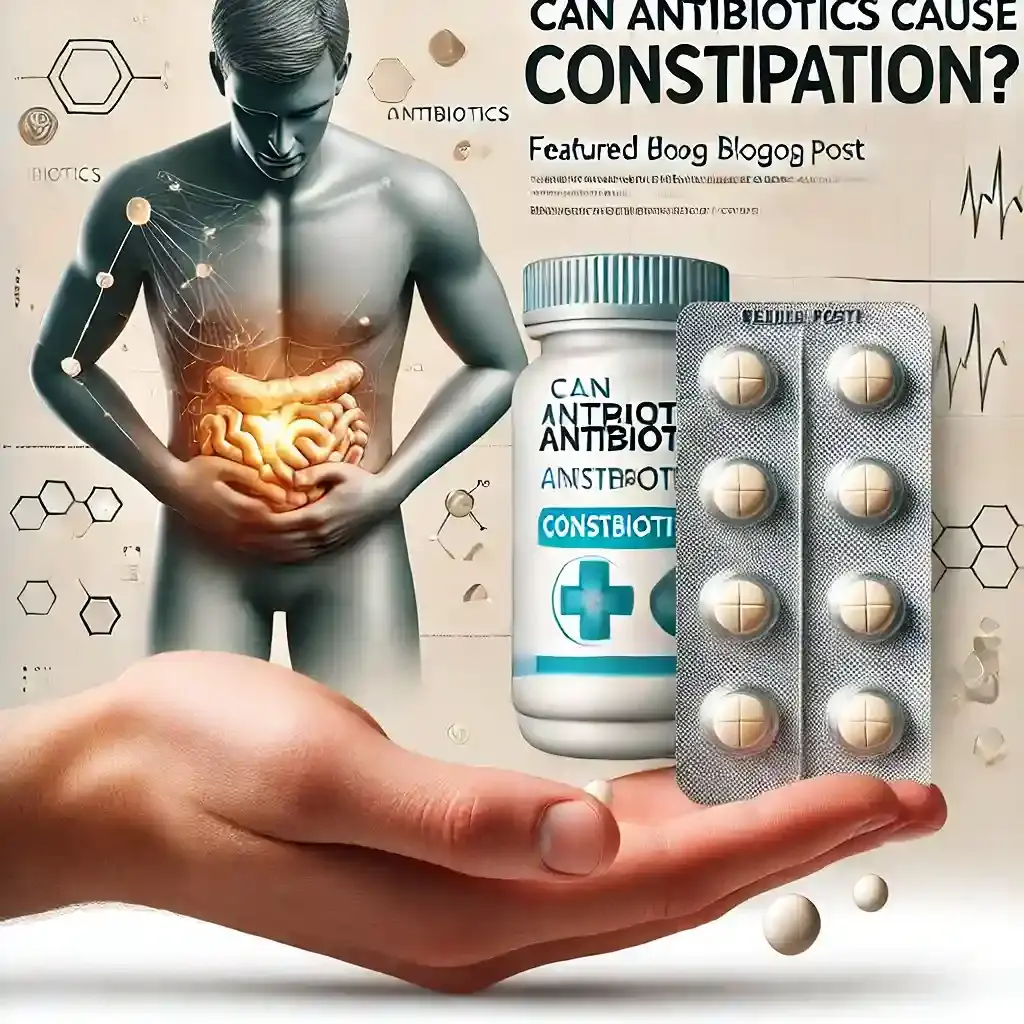Antibiotics are used for bacterial infections but also have some side effects. Thought Diarrhea is a common side effect of these medicines, some individuals may also have constipation. If you're Wondering, “Can Antibiotics Cause Constipation?” – The answer is yes. But why does this happy, and how can you prevent or relieve it? Let's break it down in a way that's easy to understand and apply to your daily life.
Can Antibiotics Cause Constipation?
Yes, according to a study, antibiotics can sometimes indirectly lead to constipation. This Risk will depend on the type of antibiotic a person is taking and other factors like dietary and lifestyle factors. Here's How Antibiotics Cause Constipation:
-
Disrupts the gut microbiome: Research States that antibiotics negatively affected the gut microbiome (an ecoSystem that consists of beneficial as well as harmful bacteria). This Slows down bowel movements and causes constipation.
-
Changes Intestinal Motility: By Affecting Intestinal Muscles and Nerves, Antibiotics Reduce the passage of food through the digestive tract, resulting in constipation.
-
Causes dehydration: by increase the loss of water via urine or lowering the absorption of fluid in the gut, some antibiotics can lead to dehydration, which hardens stools and makes it tough to passes them.
-
Reduces Digestive Enzymes: a disrupted microbiome by antibiotics can impact the release of enzymes that are required for effective digestion which has been contributed to constipation.
-
Impacts Nervous System: By Causing Dysregulation (Improper Functioning) of the Nervous System, Antibiotics Can Affect Digestive Processes and Cause Constipation.
Which antibiotics are more likely to cause constipation?
Thought any antibiotic can cause constipation, the most common ons are:
-
Clindamycin
-
Ciprofloxacin
-
Erythromycin
-
Tetracyclines
-
Cefdinir
-
Azithromycin
-
Cephalosporins
-
Amoxicillin
-
Fluoroquinolones
These antibiotics can negatively affect the gut microbiome and cause constipation, but they also lead to other digestive issues.
Other digestive side effects of antibiotics
As antibiotics impact the gut microbiome, an individual can also experience these gastrointestinal symptoms of antibiotics along
-
nausea
-
vomiting
-
diarrhea
-
stomach pain
-
bloating
-
gas
According to a study.
Some Symptoms of Clostridium Difential Infection Can Be Fatal in Some People. Hence, one should see a doctor if these symptoms person or last longer.
How to recognize antibiotic-hosociated constipation?
Watch for these symptoms that can indicate that your constipation is due to antibiotic use:
-
Infrequent Bowel Movements: Having Less Than Three Bowel Movements a Week.
-
Hard or lumpy stools: hard or lumpy stools that are different to pass.
-
Straining during Bowel Movements: Straining while Trying to Pass the Stools.
-
Abdominal pain or bloating: cramps, pain, or bloating in the abdominal area.
If these symptoms do not subseide or become severe after discontinuing the antibiotics, consult your doctor for effective medical help.
How long does it take to recover from Antibiotic-Induced Constipation?
No set time length is recommended to recover from antibiotic-Related constipation. The approved Duration will depend on the type of antibiotics, hydration levels, balanced diet, and gut health of an individual. In most cases, after discontinuing the antibiotics, constipation may get reliable in some days or a week, especially if you consider straying well-hydrated, adding probiotic to your diet, and consuming Fiber-Rich Foods.
However, if constipation lasts for more than one week and is accounatized by serial discomfort, seek medical attention.
How to Manage Antibiotic -ssociated Constipation?
Try these Science-Backed Strategies to Restore Gut Balance and Relieve Constipation:
-
Increase Your Fiber Intake: Add Fiber-Rich Foods Like Whole Grains, Vegetables, Fruits, Nuts, Or Oats to Your Diet as Fiber Promotes a healthy gut microbiome, Easing digestion.
-
Stay Hydrated: Drink a lot of water through the day to keep stools soft, ease their pass, and prevent constipation.
-
Take Probiotics: Yogurt, Kefir, Sauerkraut, or Any Probiotic Supplements Like Magnesium Citrate, and Vitamin C are the Natural Proobiotics for Gut Health That Help Restore Beneficial Gut Bacteria.
-
Limit Processed Food Intake: Processed Foods Like White Bread, Fast Food, Processed Meats, Pastries, Pastries, and Frozen Meals Can Be Hard on Your Digestive System and Might Contribute to Contil Or avoid itm.
-
Exercise regularly: Engage in physical activities such as brisk walking, cycling, swimming, or jogging regularly to stimulate digestion and relieve class.
-
Consult Your Doctor: If Constipation Persists or is Severe, Talk to Your Healthcare Provider for Guidance.
Note: In case of Severe and Persistent Constipation, seek a doctor's advice. They may help with fiber supplements, laxatives like miralax or dulcolax, and stool softners. Additionally, they may recommend “enemas” which involves introducing a liquid directly into the recording a small tube to help with Pooping. The choice of treatment will be depended on the service of the constipation and how quickly you want relief.
Other potential causes of constipation
In certain cases, Constipation while Taking Antibiotics May also Occur Due to the Following Factors:
Lifestyle factors:
-
Not consuming adequate fiber
-
Dehydration
-
Not Practicing Enough Exercise
-
Changes in regular routine like eating or going to sleep at different times
-
Consumption of Dairy Products in Large Amounts
-
Resisting the need to go for bowl movements
-
Stress
Medications that can cause constipation:
-
Strong Pain Medication Codeine, Oxycodone, and Hydromorphone
-
Nonsteroidal anti-inflammatory drugs (nsaids) such as ibuprofen and naproxen
-
Antidepressants like fluoxetine or tricyclic antidepressants
-
Antacids such as tums
-
Iron Pills
-
Allergy Medicines Like Antihistamines
-
Blood Pressure Medicines, Like Calcium Channel Blockers and Beta-Blockers
Medical conditions linked to constipation:
-
Hypothyroidism (inadequate production of thyroid hormone by the thyroid gland)
-
Diabetes
-
Uremia (Increased Levels of Urea and other waste products in the blood)
-
Hypercalcemia (High Calcium Levels in the blood)
-
Colorectal cancer
-
Irritable Bowel Syndrome (IBS)
-
Pregnancy
So, keep a watch over antibiotic-aduced constipation symptoms, and seek medical help before constipation leads to more complications like hemorrhoids (piles), anal fissures, rectal prolaps, fact Impression, or bowel incontinance and urinary tract infection (in rare cases).
Final Thoughts
So, Can Antibiotics Cause Constipation? Yes, as we have learned in the article, antibiotics can indirectly lead to constipation by affecting the gut microbiome, changing intestinal activity, revoling digestive enzymes, and incresing dehydration is This side effect is temporary and also manageable with Fiber-Rich Foods, Proper Hydration, Probiotic, and Regular Exercise. Moreover, Along with Antibiotics, Other Factors Like Stress, Dehydration, Not Consuming Adequate Fiber, Eating Dairy Products, Medicines, and Medical Issues Like Irritable Bowel Syndrome (Ibs) Diabetes, etc. can also be the culprit.
So, keep a watch over symptoms of constipation and if any symptoms person, consult the healthcare provides for proper evaluation and treatment.
Frequently Asked Questions
Can Antibiotics Cause Constipation in Children?
Yes, it can affect children by disruptting their gut microbiota. In case of Severe or Persistent Constipation, See a Pediatrician.
Is constipation a side effect of all antibiotics?
No, it's not. Diarrhea is a much more common side effect than constipation.
Should I stop taking antibiotics if I get constipated?
No, Don't stop these medicines without a doctor's advice. INTEAD, Talk to the Providers for Effective Solutions like over-the-counter remedies or lifestyle changes.
What is the best probiotic to take after antibiotics?
Lactobacillus rhamnosus gg is the best probiotic strain that can help restore the gut microbiome and lower the risk of antibiotic-induced diarrhea.



